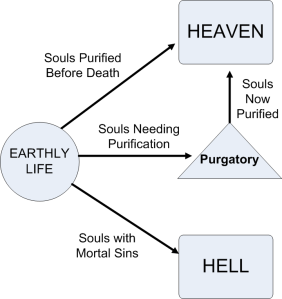Dear Doctimus Prime,
Here is something I wish to share with you ahead of All Souls Day:
We are the Church
The “communion of saints” refers to all people who have placed their hope in Christ’s resurrection and belong to him through Baptism, whether they have already pass on from this world or are still on earth. Through baptism, we are washed clean of original sin (and actual sin for those baptized as adults). Through baptism, we are also made co-heirs with Christ and members of the Church. As a Church, we are united with the Trinity, God who is Father, Son and Holy Spirit. We are established by Christ as a community of Life, Love and Truth. What this means is that we live together, we love each other and are truthful to one another. We are a Church.
Holy, Priestly and Prophetic
Since we are united to the Trinity and to each other through Christ, we share his threefold office of Priest, Prophet and King. Like Christ, you are holy, priestly and prophetic. You are holy when you do what God would have you do for your good; the more you imitate Christ in your actions, the more you are like him in holiness. As a priest (priestess), it is your responsibility to pray for others, whether alive or dead. If they are alive, they depend on your prayers to be strengthened in good works and flee evil. If they are dead, your prayers may help them obtain the mercy of God who wants everyone to be saved (2Pt 3:8-10). God’s mercy still extends beyond the grave for those who are free from mortal sin but are still not pure enough to enjoy the beatific vision (cf. 1Jn 5:17 which speaks of sin “that does not lead to death”). You are a prophet when your life challenges others to live according to a higher moral standard; that of Christ.
Helping Out
You are truly a member of the Church and united to Christ when you possess SANCTIFYING GRACE. Sanctifying grace is the life of the soul, it strengthens you to do things that are morally right and praiseworthy. If you possess sanctifying grace, you strengthen both yourself and the Church, since we all are connected to one another in Christ. This is why Saint Paul calls us a “Body”. We are the body of Christ and He is our head (Eph 1:22,23; Col 1:18). And whatever you do as a part of this body affect others. As Saint Paul said, “If one member suffers, all suffer together; if one member is honoured, all rejoice together” (1 Cor 12:26).
This simply means that you should always keep in mind that the Church is larger than we often admit. Among her members are the living and those who have slept in the Lord (whether they are still undergoing a process of purification or are already in the glory of God). We can help one another even beyond the grave. You can call on your patron saint (the one whose name you bear) and favourite saints but also your departed relatives and friends whom you believe are already with God. Also, by your intercessory prayer, you can come to the aid of your dearly departed who are still undergoing purification. Whatever you do or suffer in and for Christ benefits his whole body. So through your fasting, prayers and good works, but especially through the celebration of Holy Mass (Eucharist), you can obtain grace for the faithful departed. These act of love will count in your favour at the end of your earthly life. Beyond being members of Christ’s body, we are members of God’s household (Eph 2:19). We are all brothers and sisters in Christ.
Yours,
BLOGATRON




